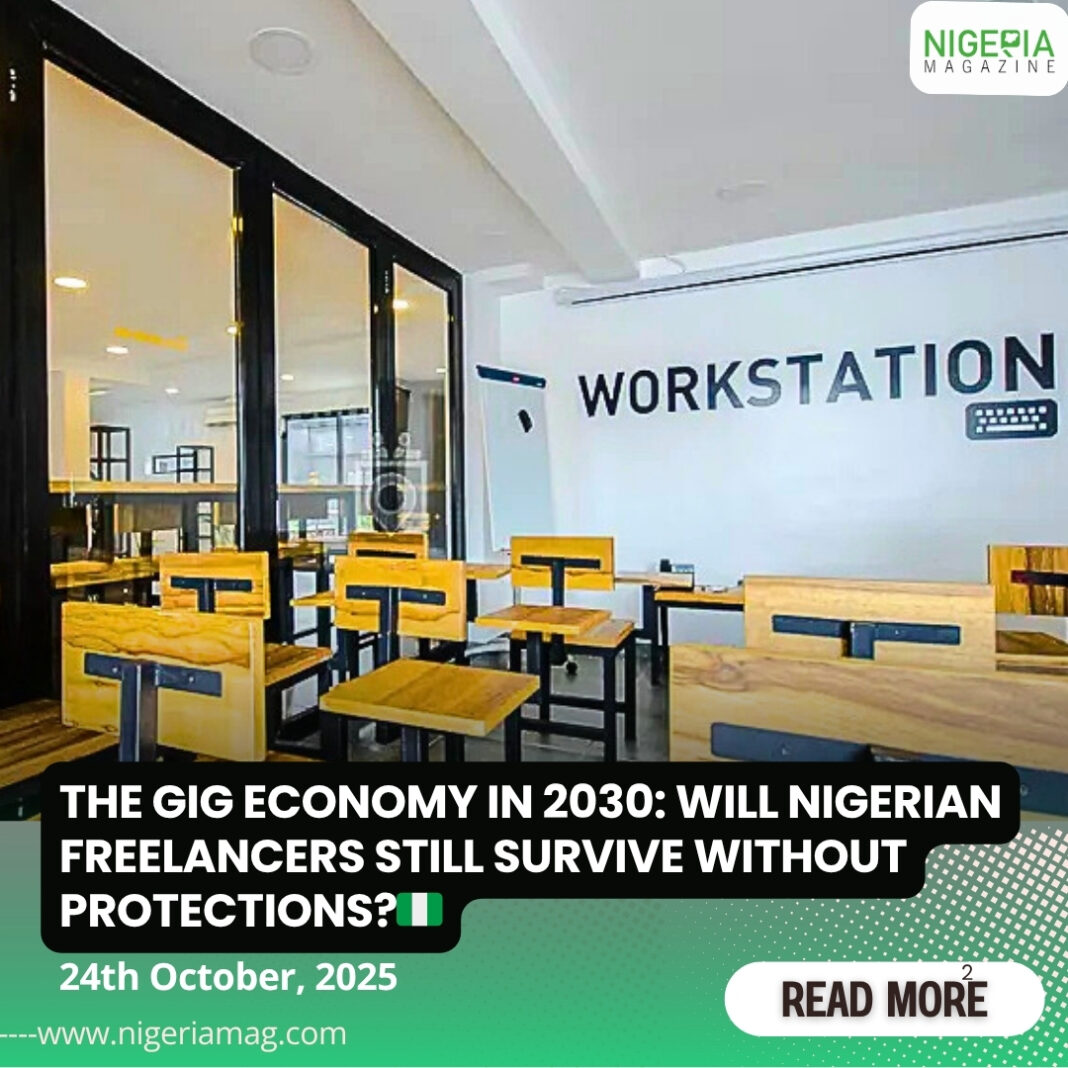The Gig Economy in 2030: Will Nigerian Freelancers Still Survive Without Protections?🇳🇬
For millions of Nigerians, gig work is no longer a side hustle — it’s a primary livelihood. From software developers and graphic designers selling services on global marketplaces, to delivery riders and local taskers meeting domestic demand, the platform economy has become an engine of employment in a country where formal jobs are scarce. But as the sector scales toward 2030, the question surfaces: can Nigerian freelancers survive — and thrive — without formal protections, or will the next five years force a reckoning?

The scale of the shift
Nigeria’s labour profile is striking. National statistics show consistently high rates of self-employment: in 2023 roughly eight-in-ten employed Nigerians described themselves as self-employed, a pattern that helps explain gig work’s rapid uptake among youth and women seeking flexible income. For many, online and location-based gigs have been a lifeline amid few formal opportunities. (verivafrica.com)
International research has flagged the same dynamic: online gig work has exploded worldwide, particularly in developing countries, offering access and income but often lacking social safety nets or stable employment protections. The World Bank estimates the global gig workforce in the hundreds of millions and warns that demand is rising far faster than protections. (World Bank)
The protection gap
On paper, Nigeria’s labour law still treats gig workers as independent contractors — outside the core protections enjoyed by employees. That legal gap means no guaranteed minimum wage, paid leave, unemployment insurance, or employer contributions to pensions for most platform workers. Multiple country assessments have found little targeted regulation for platforms, leaving gig workers in a legal grey zone. (WageIndicator Foundation)
Practical audits of platform practices in Nigeria point to worrying realities: many platforms fail Fairwork thresholds on pay transparency, decent conditions and dispute resolution; scores in recent country reviews were low, with only a handful of services able to show basic compliance with minimum wage standards after costs. For workers already operating on thin margins, that is a fragile business model. (WageIndicator Foundation)
Why gaps matter by 2030
Absent a change, three risks stand out heading into 2030:
Income volatility and poverty traps. Gig income is episodic and often net of platform fees, payment delays, and unexpectedly high costs (internet, power supply, payment transfer fees). Without unemployment or sickness protections, a single market shock can push freelancers back into precarity. (World Bank)
Market capture by global platforms. International marketplaces (Upwork, Fiverr, etc.) remain central gateways to foreign clients but impose rating systems and fee structures that tilt bargaining power toward buyers. Local talent pools may compete on price rather than sustainable rates, depressing earnings over time. (Creative Money)
Regulatory lag and fragmented responses. While other jurisdictions — notably parts of Europe — have moved to define platform worker status, responses across Africa remain patchy. Without national policy frameworks or social insurance models adapted to platform work, protections risk arriving too slowly or in ineffective forms. (Financial Times)
Signs of resilience — and potential remedies
Despite the risks, the Nigerian gig ecosystem has resilience built into it. A growing domestic stack of talent platforms, payment solutions (Payoneer, Wise, localized fintech), and co-working hubs offer freelancers community, skills training and better access to clients.
Homegrown marketplaces and talent clouds aimed at African companies are beginning to challenge the “race to the bottom” dynamics by offering vetted talent and local currency settlements. (Tech In Africa)
Policy and market fixes that could determine whether freelancers survive — or are squeezed out — by 2030 include:
Portable social protections: hybrid social insurance schemes that allow contractors to contribute small, regular amounts toward retirement, health and unemployment buffers. These can be administered through fintech rails or platform partnerships.
Minimum standards and transparency rules: mandates requiring platforms to disclose fee structures, payment timelines and automated decision logic (ratings, deactivations) would improve bargaining positions for workers.
Collective voice and representation: cooperatives, guilds or unions for freelancers can push for standards, negotiate bulk payment or insurance deals, and provide arbitration mechanisms.
Local platform development: scaling African platforms that prioritize fair fees, timely payouts and local dispute resolution could retain more value within domestic markets.
The politics of reform
Any meaningful progress will need cooperation among regulators, platforms, fintech companies and workers. Nigeria’s policymaking environment has room to innovate — but political will, enforcement capacity and competing priorities (inflation, currency pressures, jobless growth) complicate a quick legislative fix. That means much of the next five years will likely be shaped by market-led experiments (insurer-platform partnerships, freelancer unions, local marketplaces) as well as piecemeal regulation rather than sweeping statutory reform. (GLI)
Bottom line: survival is possible — but precarious
By 2030 Nigerian freelancers will almost certainly still exist — the economic incentives and digital infrastructure ensure that. But “survive” and “thrive” are different outcomes. Without targeted protections — portable social insurance, clearer legal status, platform transparency and stronger local platforms — many freelancers risk being trapped in low-paid, unstable work that reproduces inequality rather than alleviating it.
The next half-decade offers a window: policymakers and private actors can craft hybrid solutions that blend flexibility with security. If they fail to act, the gig economy in Nigeria could become a long-term safety valve for labour market failure rather than a stepping stone to prosperity. The clock to 2030 is ticking; whether that time brings rights for gig workers — or deeper precarity — depends on choices made now. (verivafrica.com)


